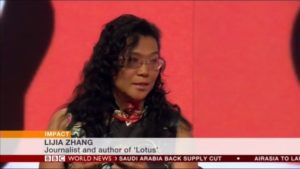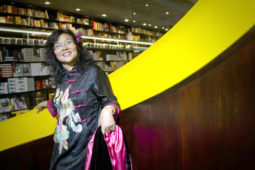 |
| Zhang Liijia |
London-based author Zhang Lijia, author of
Lotus, a novel, on prostitution in China, recalls at Varsity the crude reality women have to face in China's economy, a story many outside China might not see, speaking at Cambridge PEN, about the process of writing her latest book.
Varsity:
“I want to show the crude reality of the Chinese market economy and the resilience of women struggling in the bottom of society,” Zhang adds.
Like the characters in Lotus, Zhang has experienced what life is like in a rapidly changing China, having spent a decade working at a factory that produced intercontinental missiles. Although Zhang had dreamed of becoming a journalist and writer from a young age, she was taken out of school to work at a factory at the age of sixteen. Whilst working at the factory, Zhang taught herself English.
“Reading gave me escape and enlightenment, and it gave me a route to escape the tough reality [of the factory] and to broaden my horizons”, she says.
Upon completing a Master’s degree in Creative and Life Writing in London, Zhang returned to China and her dreams took flight as she began to write. She wrote a memoir about her time at the factory, titled “Socialism is Great!”: A Worker’s Memoir of New China. With Lotus being Zhang’s first fictional novel, she mentions how the transition from fiction to nonfiction writing styles was “extremely challenging”.
“The freedom to create a fictional world was both exciting and intimidating.” Freedom also takes on another meaning in the context of contemporary China when it comes to censorship. A previous book she wrote in Chinese about the Western image of Chairman Mao was censored, Zhang decided to write in English in order to “freely express” herself.
This helped Zhang overcome another type of censorship that was not political, but rather “a writer’s own self-censorship”, as she calls it.
“By writing in English, I gained unexpected literary freedom. By not being inhibited by my mother tongue, I can also be bold as I experiment with the language. I use different words and I structure my sentences differently, consciously and unconsciously. Of course, my experiment doesn’t always work. But I enjoy the adventure.”
Although having studied English for thirty years, Zhang says she still faces great challenges when writing in English, “I write too slowly, and I don’t understand the subtle meanings of certain words, so in that sense, I still regard myself as being a novice.”
Throughout her journey, Zhang draws upon many literary inspirations. She cites George Orwell’s four reasons for writing: egoism, aesthetic enthusiasm, historical impulse, and political purpose, as key drivers of her motivation to write. In particular, she remains drawn to Jane Eyre, “a plain-looking character full of spirit and longing”, Zhang comments. In more recent years, she mentions how reading her MA professor Blake Morrison’s memoir And When Did You Last See Your Father shaped the techniques she had used to complete her own memoir.
Following the success of Lotus, Zhang is now turning her focus back towards non-fiction. She is working on a narrative non-fiction book about the children of migrant workers in China, also known as their ‘left-behind’ children. “There are currently 61 million children living in villages across the country without both or one parent,” she says. The book will focus on a rural community in Southwest China’s Guizhou province, to examine the human cost of China’s economic miracle. As preparation, “I am reading or re-reading outstanding literary non-fiction books on China, such as Wish Lantern by Alec Ash and Factory Girls by Leslie Chang.”
As for aspiring writers, Zhang’s words of advice is to just “read and write and live your life.”
“Just going ahead and writing is the best thing you can do,” she says with a smile.
More at Varsity.
Zhang Lijia is a speaker at the China Speakers Bureau. Do you need her at your meeting or conference? Do get in touch or fill in our speakers' request form.
Are you looking for more female experts on China at the China Speakers Bureau? Do check out this list.


















